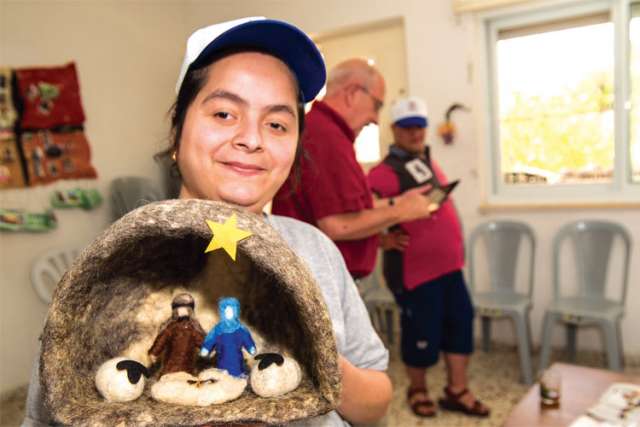Ma’an lil-Hayat is not a full L’Arche community. The 17 young core members all live with their families, but they come to the house near the wall and the checkpoint to work. They make Christmas creches in felt from the wool of locally raised sheep.
The fork in that road is more than geography. Spiritually, psychologically, humanly L’Arche lies in a different direction from walls and observation towers and border guards with automatic weapons and graffiti in praise of gun-toting resistance fighters.
In the spring of 2012, after a visit to Bethlehem, Jean Vanier wrote about the separation wall as “the wall of fear, the wall of hate, a symbol of all the walls which surround our own hearts.” In contrast he called Ma’an lil-Hayat as “a community where Christians and Muslims work, celebrate life and share meals together and meet each other at a deep level.”
This year the five-year-old workshop will move from it’s first home near the wall to a more central location near Manger Square, where L’Arche has the opportunity to own instead of renting. The new location will also expand their opportunities to sell directly to tourists and pilgrims.
Ma’an lil-Hayat covers 60 per cent of its costs selling the work of their hands. The felt creches are available in Manger Square, but also from L’Arche communities in Canada. Self-reliance is both a goal and a necessity for this little L’Arche outpost.
“We do not have a real government here, so we do not get any help,” said director Mahera Nassar Ghareeb. “We are challenged to work more and to depend on ourselves.”
Since 2009 Ma’an lil-Hayat has grown to 17 core members. Every year the community and its supporters stop to evaluate what they’ve been doing and see whether the time is right to move forward with a fully residential community.
“It is our dream to have a home one day,” said Ghareeb.
As it is, the little workshop feels like home. The day starts with conversation about a planned trip to Bethany and then news about families and events and finally who will take on which tasks in the production process for the day. Work breaks for lunch and for snacks along the way. Three separate rooms fill up with popular Arabic music — lots of Mohammed Assaf, a Palestinian and former winner of Arab Idol who dominates the Palestinian airwaves — while groups of five or six core members work together around a table.
With Sara wearing her hijab and Shukri Mora a rosary around his neck, the community quietly assumes God and religion are part of who they are without ever coming into conflict on the subject. Muslim families know their disabled children are part of a community with Christian roots, but are confident everybody respects their religion and nobody is trying to convert anybody.
Ma’an lil-Hayat relies upon the international support it receives from L’Arche International simply for the sense of being part of something bigger. The tiny little workshop embraces the world in its spirit.
“It’s not work orientated. It’s fun orientated,” notes Vanier. “And in that fun, it’s to do good work.”


